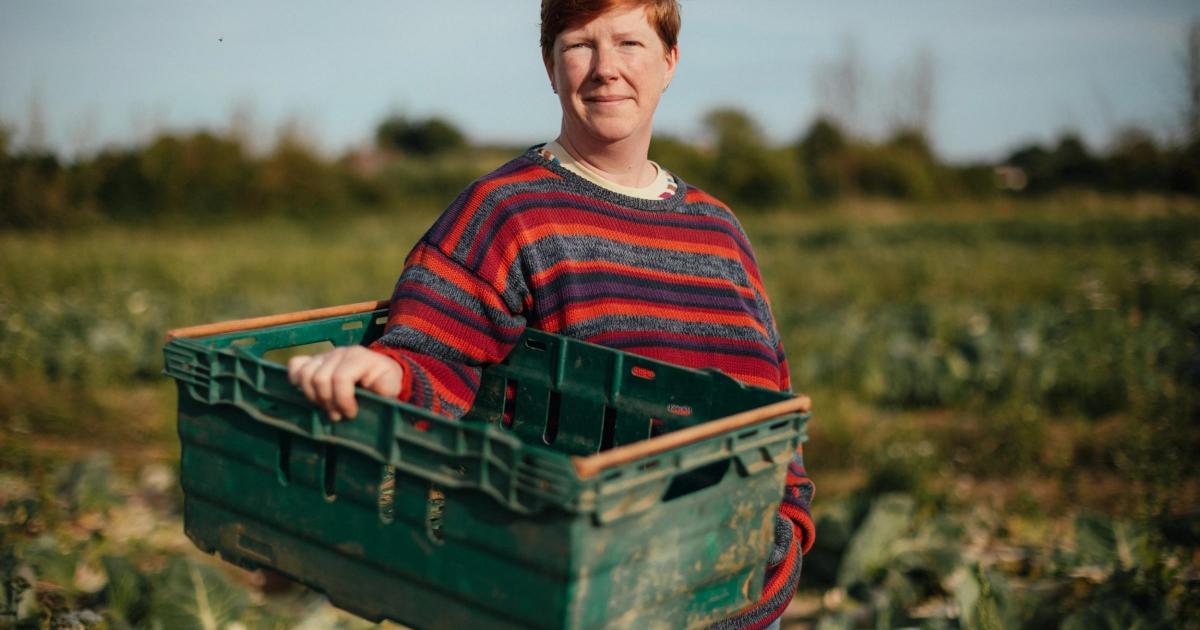Tell us a little about yourself Ella
I farm in partnership with my parents Henry and Kirsten Gent. I am the fifth generation of our family to farm at our organic farm, Mosshayne farm.
As a teenager I worked on the farm, but couldn’t see myself fitting into it, and didn’t have the passion for cows to be a dairy farmer. I went to Bristol University and afterwards came back and worked in an independent shop in Exeter (the Real Food Store, sadly now closed) which sold local, organic vegetables, farm produce and goods.
I worked there on and off for eight years, extolling the benefits of organic vegetables to customers, until I realised that, unlike many others, I had the opportunity to be a vegetable grower myself and I asked my parents about joining the family farm business.
As it happened they were selling the dairy herd at the time, and looking for a new farm venture.
We got into contact with the farming cooperative South Devon Organic Producers, who grow organic vegetables for Riverford Organics, to ask if they needed any new growers, and it turned out they did. Just a few months later we found ourselves growing organic crops for Riverford.

Tell us about your farm.
It’s to the north east of Exeter, sitting in the Clyst Valley between Pinhoe and Clyst Honiton – the first farm outside the city to that side. We have the motorway on one side, the Waterloo railway line running through the middle of the farm, and new housing estates border us, at Westclyst and Tithebarn.
We own 135 hectares of land, of which 50ha is meadows on the rivers Clyst and Pinn. Then 68ha is in rotation between vegetables and ley (we grow a mix of clover, grasses and flowers to rest the field, fix nitrogen and restore the soil structure after a couple of years of growing vegetables). We also have 17ha of woodland on the farm, some newly planted in the last five years. In addition we rent 50ha of neighbouring organic land.
Our farm is made up of gently undulating slopes, going down to the flat Clyst Valley at the bottom. The soil is a lovely red colour, quite sandy, with a mix of rounded old river stones and some volcanic rock from ancient volcanic activity coming from Killerton.
This year we’ve been growing 18ha of organic vegetables for Riverford. We grow early summer savoy cabbages and pointed cabbages, then in the autumn we harvest sweetcorn and three sorts of squash – butternut, delicata and red kobacha. Over the winter we will harvest leeks and then spring greens. These main crops are structured to keep our staff team employed throughout the year, in addition to a good mix of different sorts of crops so we can rotate the different types of vegetables in the fields each year – a really important factor for organic growing.
In the fields which aren’t growing vegetables, we grow grass and clover leys which we sell to local organic dairy farmers for their herds.
In addition to the vegetables we grow for Riverford, we have a small market garden and a polytunnel where we grow a huge variety of vegetables to stock our two farm gate honesty shops. We also have a small flock of 100 free range and organic hens, and we sell their eggs too.
We encourage local residents to use active travel to visit the farm, and to come and feed the hens and pet pigs, and stock up on their vegetables at our honesty shops.

How would you describe your approach to farming?
My parents and my grandparents made the decision go organic in the 1990s, so we joined the Soil Association, and had fully converted the farm to be organic by 2000. This decision sits steadfast in our approach to the land, and our responsibility to leave the farm in a better state than we received it. We farm alongside nature, and celebrate creating biodiversity in our pocket of countryside.
A favourite crop you grow?
Our squash is my favourite vegetable, and the best way to eat it is to simply peel, cut into chunks, and roast with herbs and garlic. It’s a classic side dish, or it can be made into a main with some easy additions.

Tell us about your daily routine.
Currently I am a bit of a part-time farmer, as I also have two children under school age. My wife also works part-time at the hospital, so we juggle the children between us, my parents and formal childcare.
I try and have two to three days a week to entirely focus on the farm, and the other days of the week I do regular check-ins with our farm foreman, Andrew and the rest of the team.
The farming day starts at 7:30am with a half hour meeting with Andrew, my dad and myself, where we decide on the main tasks of the day. Then the rest of the staff start work at 8am. We have a team of three experienced part-time workers who work throughout the year for us and then we recruit additional staff, depending on the season and the intensity of the work.
In the summer this can be planting vegetable transplants, weeding the vegetable crops (either using tractor-mounted weeding machines, or hand hoeing or pulling weeds), or harvesting vegetables into crates to take to Riverford.
Also, our chickens and pigs need tending, polytunnel crops need watering and pruning, and in hot weather we need to irrigate crops to keep them growing.
The day then ends between 4 and 4:30pm, though in the summer someone needs to wait for the chickens to go in at dusk – which around midsummer can be very late!
What’s the best thing about life as a farmer in Devon?
The community. At a farm level we have a wonderful team who wholeheartedly believe that organic farming is the best for people, animals and the planet, and they give huge amounts of energy to the farm. Then on a wider scale, I have yet to meet a farmer who doesn’t want to give helpful advice, celebrate successes and constructively build upon knowledge to farm more efficiently to the benefit of all.
What advice would you give someone starting in farming?
It’s hard work and challenging, but hugely rewarding. The relationships with others working the land can be life-changing, and the tangible result of a good crop feels fantastic
What is the biggest challenge facing you as a farmer?
Climate change. Changing weather patterns and erratic weather means that we never know what to plan for. The crops we grow are used to the mild climate of Britain, not droughts and heatwaves; in seasons like spring 2024, when it didn’t stop raining, we got behind schedule because the fields were too wet to plant into. It means that for every successful crop we grow, we can expect another to fail due to weather we could not predict.

What would you change if you were in charge?
That farming and land-based skills were more encouraged in school; that education increased awareness of the skilled nature of farming, and the hard aspects of it. That the public understood more how their food was grown, and what seasonal food looked like.
Do you have a message for the shoppers of Devon?
Buy local and support local farmers and producers. It keeps money in the local economy, has a reduced carbon footprint, and preserves Devon as a wonderful mix of rural farms in rolling countryside and towns with independent shops.
Best spot on the farm to sit and have a cuppa?
By the River Clyst, we have a pool where the river runs under the railway bridge. There’s a bit of rapids, so with the sound of the water, and swallows and house martins flying around, it’s a beautiful spot.
How do you like to take time off?
At the end of the day I like to do craft work like crochet, while watching TV or listening to a podcast or audiobook. I can switch off from the farm, but also be creatively productive.
When are you at your happiest?
With my family, eating a homemade dinner and talking about the funny things my toddlers have said or done during the day.

Herb and garlic squash with white beans and kale
This autumnal veggie meal can be got onto the table with minimal fuss. Butternut squashes are thin-skinned so needn’t be peeled before chopping, adding to the ease.
Serves 2
Ingredients
1 butternut squash, deseeded and cut into chunky 4cm pieces
200g shallots, peeled and halved
1 whole garlic bulb, halved
1tbsp freshly chopped rosemary
1 tin cooked butterbeans
150g kale, stripped from the stalked and roughly shredded
1 lemon
2tbsp green pesto
olive oil
salt & pepper
Method
Preheat the oven to 190ºC/Gas 5.
Throw the squash into a large roasting tray along with the shallots, garlic and a few tablespoons of olive oil. Season generously and roast for 30-35 mins, until tender – stirring in the rosemary halfway through.
After you have added the rosemary to the roasting tray, tip the butterbeans, along with the liquid in the tin, into a medium saucepan. Season cautiously with salt, checking to see if they are already seasoned first.
Bring up to a gentle simmer and cook for 10 minutes until they are heated through and the liquid is reducing.
Add the shredded kale and cook for a further 5-6 minutes until it is wilted and tender.
Remove the squash from the oven. Tease the softened garlic cloves from their skin and coarsely mash them with a fork.
Fold the garlic into the beans along with the pesto and a squeeze of lemon. Taste and tweak the beans to your liking with salt, pepper and more lemon.
Serve the beans in shallow bowls topped with the roasted squash and shallots.

